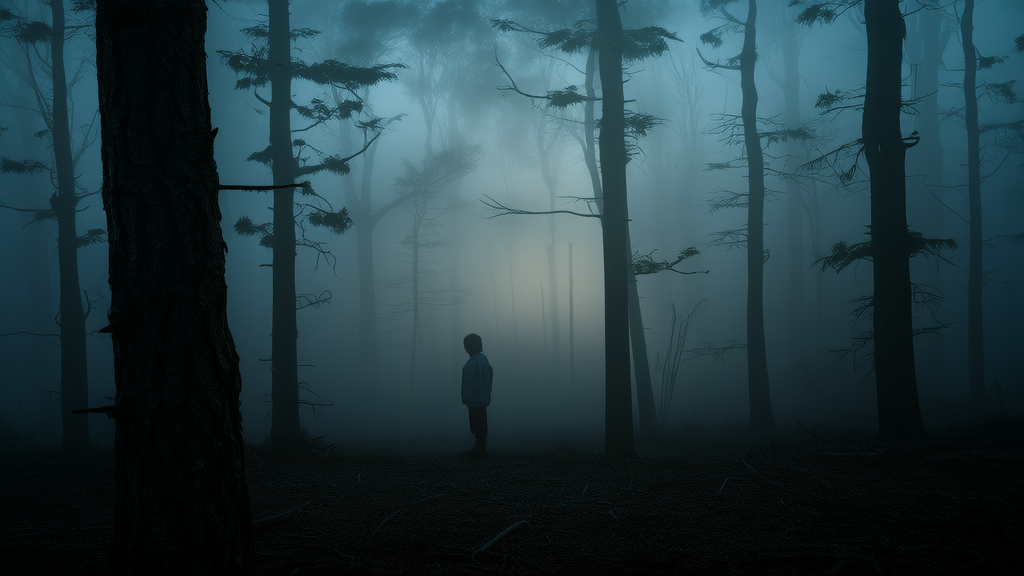🔮 Weird Tales & Urban Legends
The Boy Who Walked the Mist and Never Returned to Black Hollow

In the quiet town of Black Hollow, nestled between two forgotten mountains, there are stories that don’t quite fit into any book. The locals speak of them in hushed tones—of creatures that slip through the mist and vanish before anyone can be sure they were ever there. Most dismiss these tales as folklore, but those who have lived long enough to see the seasons change know better.
It began with a child. A boy named Eli, no older than ten, who would wander the forest every evening, barefoot and whispering to the trees. His mother, a woman with tired eyes and a voice that never rose above a murmur, told the neighbors he had been born under a blood moon. She said the stars had shifted when he was born, and that the woods had called him. No one believed her, but they watched him anyway, curious and cautious.
One night, a group of teenagers from the nearby city came to Black Hollow for a camping trip. They heard the stories, laughed at them, and set up their tent near the old stone bridge that spanned the river. That night, they woke to the sound of something moving in the trees. It wasn’t the wind. It wasn’t an animal. It was slow, deliberate, and it made no noise at all. One of the boys ran back to the campsite, shouting that something was following them. When they turned, the forest was empty.
The next morning, the teenagers left in a hurry, refusing to say what they had seen. But the town didn’t need their testimony. That same night, a man named Mr. Thorne, who had lived alone in a cabin on the edge of the woods, disappeared without a trace. His door was locked from the inside, his lantern still burning. The only thing found was a single footprint in the dust, too large for a human foot, and too narrow for anything else.
Eli continued to walk the woods, undeterred by the warnings. He would sit beneath the old oak tree where the roots twisted like fingers, and he would talk to the shadows. The townspeople watched him, some with fear, others with fascination. They said he had grown paler, his eyes darker, as if the forest had begun to take something from him.
Then came the winter. Snow fell in thick blankets, burying the town in silence. The roads became impassable, and the people stayed indoors, wrapped in wool and worry. But Eli never stopped walking. One morning, a woman saw him standing at the edge of the woods, his face tilted upward as if listening to something only he could hear. When she called out, he didn’t turn. He simply stepped forward, into the white, and was gone.
The townspeople searched for him, but there was no sign. Only the snow, untouched by footprints, and the faintest echo of a low, melodic hum that drifted through the trees. Some claimed it was the voice of the forest itself, calling its own.
Weeks passed, and the snow melted. The town returned to its routine, though something had changed. The air felt heavier, the shadows deeper. Then, one evening, a group of children playing near the river stumbled upon something strange—a small, carved wooden figure, half-buried in the mud. It was shaped like a human, but its limbs were too long, its face featureless. When one of the children picked it up, the wood felt warm, as if it had just been carved.
They brought it to the town’s elder, a woman named Mira, who had lived in Black Hollow longer than anyone could remember. She looked at the figure and said nothing. That night, she went to the old oak tree and placed the carving beneath it. The next morning, the children found it gone, replaced by a new one, this time with a single eye carved into its forehead.
No one spoke of it, but the feeling in the town grew heavier. People began to dream of the forest, of things that moved in the dark, of voices that whispered in languages they didn’t understand. And sometimes, when the wind howled through the trees, it sounded like a song.
But the most disturbing thing was the way the children started to behave. They would run into the woods at dusk, laughing, and return hours later with strange stories, their eyes wide and their hands stained with dirt. They spoke of a being that walked among the trees, neither man nor beast, but something in between. They said it had no name, only a presence, and that it watched them, always watching.
And then, one day, the town awoke to find the old oak tree gone. Not cut down, not burned, but simply... missing. Its roots, its branches, everything. In its place stood a hollow, smooth and dark, as if the earth itself had swallowed it whole.
No one has entered the forest since. But sometimes, when the moon is full and the wind is still, you can hear the song again. Low, soft, and waiting. And if you listen closely, you might wonder if the forest isn’t just alive—it’s remembering.
发布于 en
🔗
相关站点
- AI Blog — AI 趋势与技术新闻